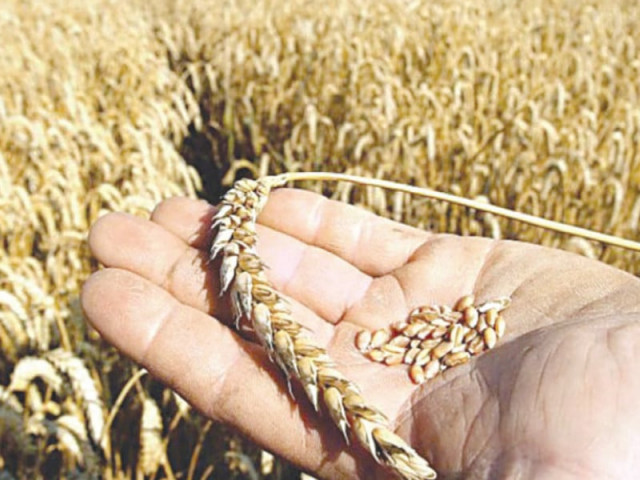ECC recommends free wheat market
Gives proposal to enable federal govt avoid liabilities of billions of rupees

Pakistan's economic managers have recommended the deregulation of procurement and distribution of wheat to eliminate liabilities of the federal government as Khyber-Pakhtunkhwa (K-P) refused to lift stocks of the imported commodity.
Sources told The Express Tribune that the Economic Coordination Committee (ECC) of the cabinet, in a recent meeting, directed the Ministry of National Food Security and Research to come up with a strategy to help the federal government stay away from wheat procurement and distribution by deregulating the process and allowing the market to shoulder such responsibilities. Moreover, Gilgit-Baltistan (G-B) and the army requested supply of 100% locally produced wheat because of concerns over the quality, taste and texture of the imported commodity.
During discussions, the K-P government stated it was ready to lift the stocks kept at warehouses of Pakistan Agricultural Storage and Services Corporation (Passco), as needed. However, the food ministry noted that wheat was imported at the request of K-P and different agencies, so they should accept those supplies as per the ratio of 50:50 to prevent liabilities of Rs87.2 billion on the federal government.
The ECC approved allocation with a 50:50 ratio for all entities, except for G-B, for which the ratio was set at 75:25. It directed Passco to conduct lab tests of the imported wheat to confirm whether it was fit for human consumption, considering the delay in its supply after import. Passco was also told to develop a reliable testing mechanism to ensure the quality of wheat at the time of its procurement. Additionally, the ECC recommended the deregulation of procurement and distribution of wheat.
The food ministry briefed the meeting that "Passco is a state-owned company that procures and stores wheat for two main purposes – maintaining strategic reserves for emergency use and supplying to seven wheat-deficit agencies and regions based on their annual demand". Passco procures wheat from Punjab, Sindh and Balochistan. For food year 2024-25, the ministry received a demand for 1.398 million metric tons from seven agencies and regions. However, only 0.266 million metric tons were lifted by the end of September 2024, leaving a substantial stock of 1.132 million tons.
Specifically, K-P requested 143,618 metric tons, but did not lift any stock, leaving its entire demand unfulfilled.
Azad Jammu and Kashmir needed 156,382 metric tons, of which 61,137 tons were lifted, with pending supplies of 95,245 tons. G-B requested 141,313 metric tons but lifted only 10,485 tons, resulting in a shortfall of 130,828 tons.
Pakistan Army, with a demand for 160,000 metric tons, lifted 33,687 tons with remaining supplies of 126,313 tons. Pakistan Air Force requested for 10,500 metric tons and lifted 2,500 tons while the remaining 8,000 tons were yet to be procured.
Pakistan Navy had a demand for 2,500 metric tons but did not lift any stock. Finally, the Utility Stores Corporation required supplies of 450,000 metric tons but lifted only 14,887 tons, leaving a significant balance of 435,113 tons.
The food ministry further explained that at the start of food year 2024-25 on April 1, 2024, Passco's carry-forward wheat stock stood at 1.266 million metric tons, including the imported stock of 0.678 million tons from 2021 and 2022 and domestic stock of 0.588 million tons from 2022 and 2023. In 2024, Passco procured a new domestic stock of 1.789 million metric tons. To manage the remaining imported stock of 0.678 million tons (reduced to 0.555 million tons as of October 1, 2024), it proposed a release ratio of 50% domestic and 50% imported wheat for all agencies and regions to mitigate the risk of quality deterioration due to pest infestation and other issues.
The ECC previously approved a 50:50 domestic and imported supply ratio with the exception of G-B, for which a 75:25 ratio was fixed.
In February 2024, the ECC approved 100% domestic wheat allocation for G-B until a permanent solution was found, though Passco contested that interpretation as the region was lifting only 75% of the domestic quota. Given the significant cost associated with holding the imported stock, valuing at Rs67.2 billion, but estimated at Rs41.1 billion in the market, it was proposed that the agencies lift wheat based on a 50:50 ratio to help Passco avoid losses.
It was proposed that Passco should allocate wheat to the seven agencies and regions at a 50:50 ratio for complete disposal of the imported stock and ask all of them to lift their quota during food year 2024-25. It demanded the issuance of directives to all agencies and regions as well as the Finance Division to clear their outstanding dues of Rs193 billion by December 2024.
The ECC reviewed a summary submitted by the Ministry of National Food Security titled "Allocation of Domestic and Imported Wheat Stocks of Passco among Agencies/Regions for Food Year 2024-25", and approved the proposals with some modifications.
It asked the food ministry to collaborate with the Finance Division to devise a strategy for managing the accumulated liabilities.
The ECC directed Passco to arrange lab tests of the imported wheat to confirm its suitability for human consumption and establish a sustainable and reliable testing mechanism at the time of lifting of the commodity by the agencies.



















COMMENTS
Comments are moderated and generally will be posted if they are on-topic and not abusive.
For more information, please see our Comments FAQ